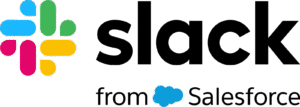| Microsoft Teams |
Slack excels with its intuitive, channel-focused interface, ideal for agile teams and project-based work. It offers over 2,600 app integrations, including Jira, Salesforce, and Google Calendar, making it a versatile hub for diverse tech stacks. Users praise its clean, customizable design with features like custom emojis and light/dark modes.
Slack’s Workflow Builder allows no-code automation, streamlining tasks without technical expertise. Its Slack Connect feature enables seamless collaboration with external partners. Customer reviews highlight its ease of use and robust search functionality for quick information retrieval. |
| Google Chat |
Slack stands out with its extensive app ecosystem, offering over 2,600 integrations compared to Google Chat’s focus on Google Workspace. Its Canvas feature enables dynamic document collaboration, better than Google Chat’s simpler chat organization.
Slack AI provides advanced features like thread summaries and daily recaps, enhancing productivity. Reviews commend Slack’s user-friendly interface and mobile accessibility, making it more flexible for teams not tied to Google’s ecosystem. Slack’s customizable notifications and Slackbot automation further improve workflow efficiency. |
| Rocket.Chat |
Slack offers superior ease of use with a polished, modern interface compared to Rocket.Chat’s developer-focused UX, which can be less intuitive for non-technical users. Its vast integration library and no-code Workflow Builder make it more accessible for automating tasks without coding expertise.
Slack’s Enterprise plan provides advanced security features like HIPAA compliance, appealing to regulated industries. Customer reviews favor Slack for its seamless real-time communication and robust search capabilities, ideal for dynamic teams. |
| Discord |
Slack is tailored for professional environments, offering a structured, business-oriented platform with features like Canvas, Lists, and Slack AI for task management and collaboration.
Its extensive integrations and enterprise-grade security, including GDPR and FINRA compliance, make it more suitable for businesses than Discord’s community-focused design. Reviews highlight Slack’s intuitive interface and customizable workflows, which streamline communication and project tracking for corporate teams, unlike Discord’s gaming-oriented roots. |

